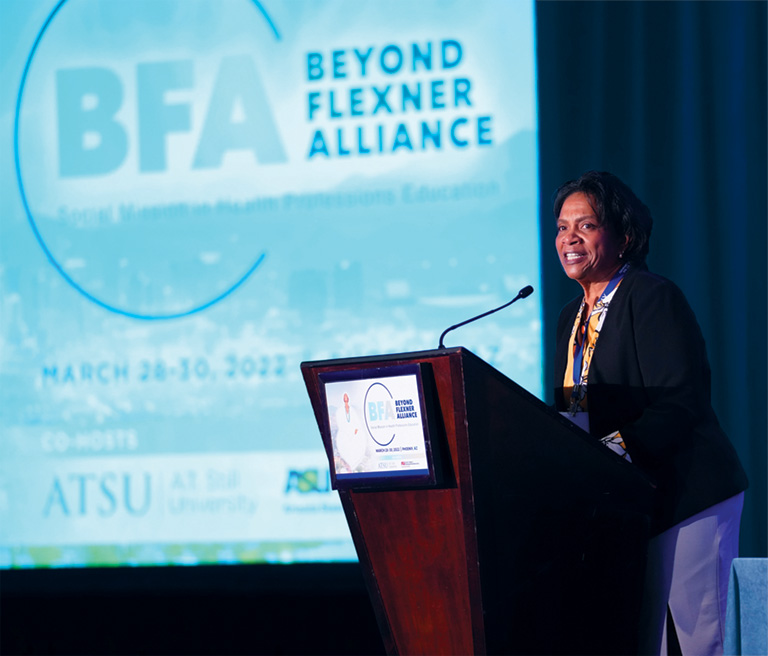2022 Beyond Flexner Conference
Posted: January 12, 2023
Moving the dial on social mission: Ensuring health professions education meets the challenges of today
With powerful messages on the future of health professions education advancing health equity and social justice, the 2022 Beyond Flexner Conference was held March 28-30 at the Hyatt Regency in Phoenix. The three-day event, cohosted by ATSU and Arizona State University’s Edson College of Nursing and Health Innovation, featured keynote speeches and breakout sessions gathering leaders with a goal to bring about meaningful change.
Kim Perry, DDS, MSCS, FACD, associate vice president, strategic university partnerships, ATSU
On Beyond Flexner Conference inspirations:
“We also heard that our voice and our vote matter if we’re going to make a difference in the lives of others. The breakout sessions … and the (research) posters demonstrated meaningful scholarly ways that you are moving the dial to include advances in vaccine research.”
Daniel E. Dawes, JD, director, Satcher Health Leadership Institute, Morehouse School of Medicine
On understanding race and racism’s impact on health:
“Research is showing how little progress we are making in eliminating health inequities. Within healthcare and public health, we are awakening thanks to the groundbreaking research by many of you here today, to the ways that research has falsely looked at race as a biological attribute, rather than a social construct over centuries, contributing to systems of racism in healthcare delivery, education, housing, transportation, employment, and public health. At long last, medical, nursing, public health science, and more are declaring race is not just biological, but that racism has profound consequences for health.”
Kenya Beard, EdD, AGACNP, CNE, ANEF, FAAN, associate provost, social mission & academic excellence, Chamberlain University
On eliminating racial bias in health professions curriculum:
“I remember sitting in the classroom and hearing time and time again, ‘If you are Black, you are more likely to have hypertension. If you are Black, you are more likely to be obese.’ What does that do to a student … what does that do to a 17 year old, hearing this narrative over and over? It was demoralizing, especially when there are only two or three people who look like you in the classroom, and whenever the teacher says anything that has to do with ‘Black,’ people get quiet and they look.”
Gary Cloud, PhD, MBA, vice president, strategic university partnerships, ATSU
On ways ATSU is working to keep providers in underserved communities:
“In Hometown Scholars, we ask the nation’s health centers and clinics to tell us who ought to be going to school, who ought to be tomorrow’s physician, dentist, physician assistant, and other professions for which ATSU offers programs. Also, we have a strategy of infusing talent into communities by moving to learning in place. Each new program we’ve started has a stronger version of learning in place, with the intent of infusing talent into communities. Today there are under contract 49 community health centers, from Hawaii to New York, where we have miniature schools going on, where some piece of the education is taking place. If you tie those two together, these health centers are in a position to say, ‘Here are the students in our community who have the right heart to come back and serve, and they are going to stay right here and learn for a piece of or, eventually we hope, all of their education.’”
Harriet A. Washington, award-winning medical writer & editor
On the importance of addressing both implicit and intentional bias:
“I think there is too much focus on implicit bias. I think I understand why. It’s more comfortable to discuss. It’s more comfortable to talk about a bias one is not necessarily aware of, the results of, for lack of a better adjective, innocent misunderstanding, than to acknowledge the existence of biases that are intentional. I don’t think we can afford to ignore the latter. I think we need to address both.”
Beyond Flexner Alliance officially changed its name to Social Mission Alliance as of Dec. 8, 2022.